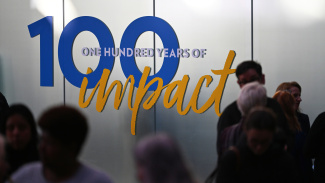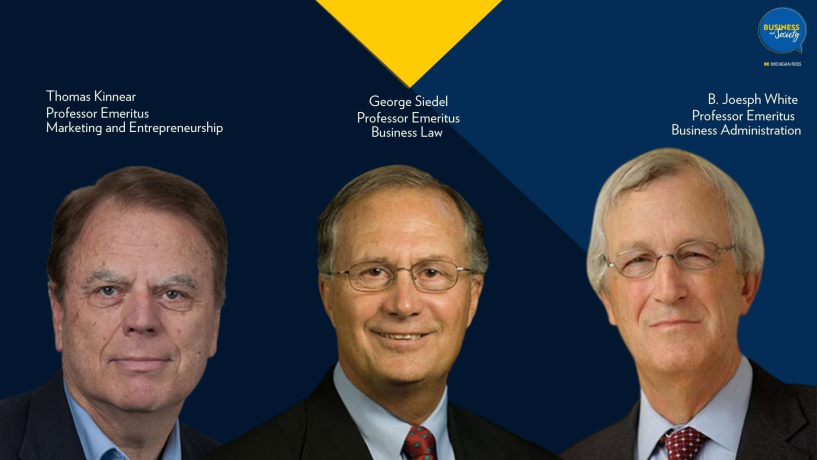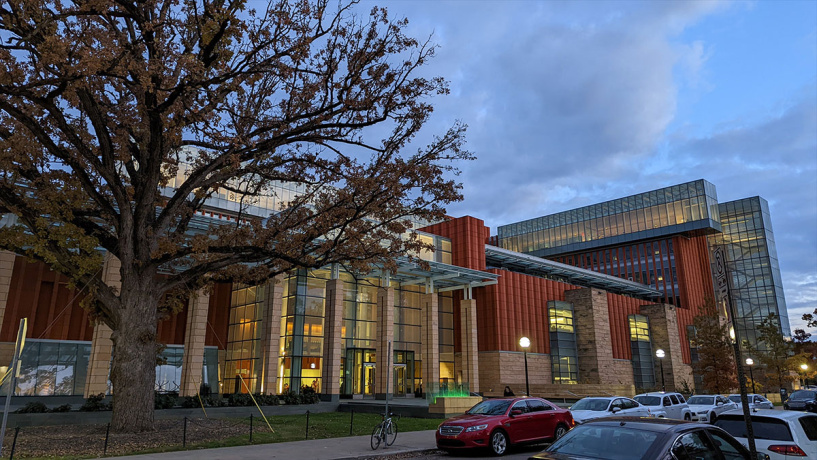A Century of Giving Impact at Michigan Ross

Explore the 100-year history of the Ross School of Business — established as the University of Michigan’s School of Business Administration in 1924 — and discover a legacy of continuous innovation and expansion to meet emerging trends in business school education. Philanthropic support has helped to spur progress and maintain a high standard of excellence along the way. Here is a timeline of several of the school’s historical developments — and some of the generous donors who helped make them possible.
Early forms of fundraising at the university
By some accounts, U-M has been fundraising for well over two centuries. A Detroit Gazetteer article published on Sept. 19, 1817, congratulated fellow citizens — then of the Michigan Territory — on the rapid and liberal manner in which the “Subscription List” grew for the newly planned University of Michigania or “Catholipisteomaid” in Detroit. Subscribers were, essentially, early donors to U-M before there was even a physical school. Some of the first gift pledges to the emerging school included $250 from the Masonic Lodge, $200 from Secretary of the Michigan Territory William Woodbridge, and $180 from the Michigan Territory.
The 1920’s: The founding and funding of the business school

In 1889, U-M began offering business administration courses through the Economics Department of the College of Literature, Science, and the Arts, and students who completed the curriculum could receive a certificate in Business Administration upon graduation. As demand for business administration studies grew, it became increasingly evident that professional instruction in the subject would best be done through a dedicated business school. At their meeting on Dec. 20, 1923, the U-M Board of Regents voted to establish a School of Business Administration as of July 1, 1924. The School of Business Administration enrolled its first students at the opening of the 1924-25 academic year, with funding primarily covered by tuition fees and state support. Its original location was in Tappan Hall.
1930’s: A decade of growth and expansion
The need for more steady funding became apparent as the business school completed its first decade. That’s when alum bequests and donations came into play. In 1932, the School of Business Administration published its annual announcement, in which it praised the fact that the school had recently become “more and more frequently the recipient of bequests and donations from public-spirited alumni and citizens of Michigan and other states who see in the state university a means of serving the present and the future.”
At the time, U-M had about 150 permanently endowed funds — compared to 8,240 today — including at least one that benefited the School of Business Administration.
The year 1935 was a pivotal one for the School of Business Administration. That’s when the school established the Bureau of Industrial Relations with a gift from the Earhart Foundation to respond to the growing need for organizations to build and maintain positive working relationships with their employees. The bureau hosted an annual conference that brought corporate representatives together to discuss labor and personnel relations. This led to the school’s first-ever executive development programs and was an early example of how private corporate gifts helped the school expand its programming to help meet the evolving needs of business and society. Successful graduates of the 1930s became donors to the school in the 1940s and on.
1940’s: The school’s oldest endowed scholarship fund

In 1942, the business school launched a Bachelor of Business Administration program. One of the business school’s oldest endowed scholarship funds —where interest on the investment is used to fund annual scholarships into perpetuity — is the Ensign Lionel J. Tachna Scholarship Fund. It was established through a private gift in April 1943 to commemorate the memory of Ensign Lionel J. Tacha, a 1939 MBA graduate of the U-M School of Business Administration. At the time, the per-semester tuition for the MBA students was $60 for Michigan residents and $100 for non-residents.
Based on income-tax returns, charitable contributions in the U.S. grew by five times between 1939 and 1945.
1950s: The post-war boom at the B-school

The booming post-war economy and the financial benefit of charitable gift tax deductions spurred healthy philanthropic giving in the 1950s. The university capitalized on the times by establishing the Michigan Alumni Fund in 1953. One of the first donations came from David E.A. Carson, BBA ’55, who made a milestone gift in 2005 to establish the Carson Scholars Program, a three-credit business and public policy course taught in Washington, D.C.
“My Michigan education began in 1951,” Carson said. “I realized from the start that the State of Michigan had created a great institution without any support from me or my family, and I started to get the feeling that I should.”
Additionally, dozens of alums donated money to establish the William A. Paton Scholarship Fund for accounting scholarships and fellowships. The scholarship continues to create immeasurable opportunities for BBA and Master of Accounting students to experience Ross’ unique approach to accounting education, which goes far beyond preparation for the Certified Public Accountant exam.
“Thanks to the Paton Scholarship, as an out-of-state student, I could focus on my coursework and the recruitment opportunities at Ross without the anxiety of excessive student loans,” said Brian Perrine, BBA, ’14/MAcc, ‘15
1960s: Remaining steady in changing times
In 1966, thanks to private support, the business school established the William K. McInally Memorial Lecture Series in honor of William K. McInally, who served on the U-M Board of Regents from 1960 to 1964. The lecture series remains open to the public and is supported by an endowed fund established by McInally’s family and friends.
In 1967, the Sebastian S. Kresge Professorship in Marketing Fund was established. It is the school’s oldest endowed professorship to fund a faculty chair in marketing. In a school press release, the dean at the time, Floyd A. Bond said: “The holder of this chair will further strengthen the research and teaching capabilities of our faculty, already among the most distinguished in the nation, and enhance the school’s ability to attract students of the highest caliber.”
The 1970s: A milestone era for alum support to the school
During the early 1970s, Dean Bond declared that physical expansion was necessary to accommodate the changing needs of students and professors — and that private funding was required to do so. Again, business school alums with a sense of school pride heeded the call. The ground was broken for the $1.5 million Assembly Hall in 1971, with the building’s cost financed entirely by private contributions. The dedication occurred in Hale Auditorium, named for primary donor Clayton G. Hale, in 1972. The school’s first two alumni clubs were established in New York and California in 1972.
In 1976, another new building was dedicated at the University of Michigan: the William A. Paton Center for Accounting Education and Research. The structure added much-needed classrooms, offices, board rooms, an auditorium, and facilities to host guest speakers — and it was financed entirely by former students and private donors.
Around 1979, the School of Business Administration established what was referred to as the "Business School Fund," the equivalent of today’s Michigan Ross Annual Fund. That’s also when the school hired its first full-time Director of Development and Alumni Relations. The era of more formalized fundraising had emerged.
The 1980s: Fundraising moves into high gear
Fundraising as a dedicated profession culminated at the business school in the 1980s. Dean Gilbert R. Whitaker, Jr. established the school’s first-ever Development and Alumni Relations Department, now called the Office of Advancement. The dean wanted the school to be among the top three business schools in the country and believed that new facilities and a bolstered curriculum were needed to achieve this elite ranking. In a 1980 annual report, Dean Whitaker said: “A strong partnership of foundations, corporations, alumni, and friends is essential to success in these exciting aspirations.”
Dean Whitaker announced an ambitious $15 million fundraising campaign to raise funds for a library, a residence for executive participants in educational programs, and a center for Executive Education and computer facilities. Despite an economic recession, the drive raised $2 million more than its goal.
In 1983, an alum named J. Ira Harris, BBA ’59, established the J. Ira Harris Scholarship for MBA students with demonstrated financial need and academic merit. To this day, according to Mr. Harris’ wishes, recipients are asked to commit to substantial contributions to the scholarship fund after graduation. More than 60 percent of past scholarship recipients give back to the fund as alums, helping to carry on a tradition of philanthropy for student support. The Harris family members continue to be loyal contributors to Ross.
A former Harris Scholarship recipient, Britanni Banks, MBA ’22, said this about Harris: “The fact that he had the forethought to include a provision asking recipients to consider contributing to the scholarship fund is why I applied. That pay-it-forward mentality is the Michigan difference in action, and it challenges me to define how I can create a similar impact once I graduate.”
In 1987, the school established the Office of Tax Policy Research to encourage and facilitate joint research on the tax system by economists and scholars of other disciplines and to liaise on tax issues among the academic, business, and policy-making tax communities. Private gifts helped to bring the office to fruition.
1990s: The early years of action-based learning and more
In the early 1990s, thanks to private funding from alums, the school launched two prominent institutes back to back. The William Davidson Institute at the University of Michigan was established in 1992 through a multi-million gift from William Davidson, BBA ’47, to help businesses in transitional societies adapt to a free-market economy. The Tauber Institute for Global Operations was established in 1993 with a gift from Joel D. Tauber, BBA '56, to provide students with action-based education and experiences for solving operations challenges of top companies worldwide.
Action-based learning became a foundational part of the business school’s curriculum and changed the landscape of business education with the introduction of the Multidisciplinary Action Projects (MAP) course. In the course, students worked in teams and consulted with an external organization for seven weeks to solve a real-world business challenge. By the late 1990s, MAP expanded to include international projects, reflecting the increasingly global nature of business.
In 1996, Frederick Erb, BBA ’47, and Barbara Erb (the Frederick A. and Barbara M. Erb Family Foundation) gave a $5 million endowment gift to establish the Frederick A. and Barbara M. Erb Environmental Management Institute as a joint venture between the business school and the School of Natural Resources and Environment, now known as the School for Environment and Sustainability. Subsequent gifts totaling $20 million represent the most extensive known commitment to a university for interdisciplinary teaching and research in global sustainable enterprise. Today, the institute has grown to include scholarly and applied research on business sustainability and direct business engagement to turn ideas into action through on-the-ground projects with companies, social enterprises, and nonprofits committed to business sustainability.
In 1999, real estate investor Samuel Zell, BA ’63, LSA/JD ’66, and Ann Lurie, LLD Hon ’03, made an unprecedented gift to establish the Samuel Zell & Robert H. Lurie Institute for Entrepreneurial Studies. Now referred to as the Zell Lurie Institute or ZLI, the Institute advances the knowledge and practice of entrepreneurship and innovation through various activities, including programs, competitions, academics, symposia, and global community outreach.
21st-century giving to the school
Philanthropy continued to help fund additional centers, institutes, and initiatives during the 21st century. Here’s a chronological listing of some of the major gifts of $1 million or more that spurred growth and innovation in the 2000s.
- In 2002, John Tozzi, MBA ’67, made a gift to establish the Tozzi Electronic Business and Finance Center, a state-of-the-art financial and educational hub. At that time, there were only a few similar labs in the country, and the goal was for the center to differentiate Michigan Ross from other top business schools. There are now more than 200 of these labs across the country.
- In 2004, Stephen M. Ross, BBA ’62, chair and founder of the Related Group, made his first $100 million gift to the Michigan Business School, and the University of Michigan Regents renamed the school the Stephen M. Ross School of Business. The new $145 million Stephen M. Ross building opened in 2009. The dean at the time, Robert J. Dolan, said this about the record-breaking gift: “The extraordinary generosity of Stephen Ross will make it possible for us to build our future as the top business school in the nation.”
- In 2005, Thomas C. Jones, BBA '68, MBA ’67, established what is now referred to as the Thomas C. Jones Undergraduate Innovation Initiative to enhance the core educational experiences of undergraduate students through a robust portfolio of innovative leadership development opportunities, action-based learning programs, and integrative experiences. When Jones made his gift, it was the largest donation ever to an undergraduate business program.
- In 2008, David G. Frey of the Grand Rapids-based Frey Foundation established the Edward J. Frey Deanship Fund in honor of his father. On Aug. 1, 2022, Sharon F. Matusik became the dean of Michigan Ross — and the 10th dean to hold the Edward J. Frey Dean of Business title.
- In 2013, Andrew D. Small, BBA ’86, made a leadership gift to fund global experiences for undergraduate and graduate students. The initiative offers various semester study abroad opportunities, internships with international companies, global immersion courses, and more. Last year, nearly 25 donors contributed to global experiences at the school.
- In 2014, Jane Och, BBA/MAcc ’86, and her husband, Daniel Och, established the Och Initiative for Women in Finance to cultivate interest in finance careers among female BBA students. In its 10-year history at Ross, the initiative has helped to nearly double the number of female graduates who go into finance as a career after graduating, an incredible accomplishment.
- In 2014, thanks to the legacy of giving of Sanford (“Sandy”) Robertson, BBA, ’53, the business school named its 500-seat auditorium the Robertson Auditorium. The state-of-the-art auditorium allows Ross to accommodate large audiences for signature events, helping to boost our engagement with internal and external audiences.
- In 2015, Stephen W. Sanger, MBA ’70, and his wife Karen Sanger made a $20 million gift to establish the Sanger Leadership Center to provide students and alums with unparalleled leadership development experiences.
- In 2016, thanks to a gift from Jeff Blau, BBA ’90, CEO and partner of Related Companies, Ross opened the Jeff T. Blau Hall and renovated Kresge Hall.
- In 2017, Stephen M. Ross gave the business school an additional $50 million. This legacy gift helped the school to invest in several critical areas related to student success, faculty innovation, and action-based learning. A portion of the gift also went toward completing and maintaining the Michigan Ross campus.
- In 2020, Ron Weiser, BBA ’66, made a landmark gift to establish the Weiser Center for Real Estate. A vital component of the university-wide initiative is to offer students from underrepresented backgrounds the opportunity to learn about real estate and investing and increase their interest in real estate careers.
- Gifts to the Michigan Ross Annual Fund also continue to play an essential role in helping the school and its students to thrive. Between 2013 and 2018 — during the Victors for Michigan campaign — nearly 17,000 donors gave Ross $415 million in gifts, 58 percent of which came from gifts of $100 or less.
Looking toward the next 100 years

As Michigan Ross embarks on a second century as a business school, it will continue to look to donors to help the school maintain and build upon its legacy of excellence, action, impact, and community. With philanthropic support, Ross will further advance its mission of building a better world through business.







